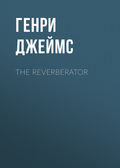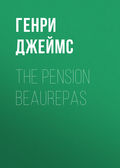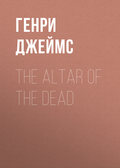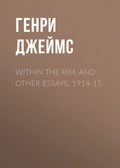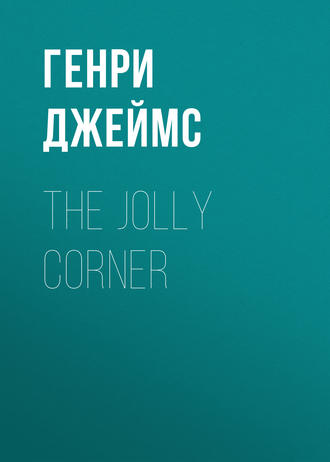
Генри Джеймс
The Jolly Corner
“He has been dodging, retreating, hiding, but now, worked up to anger, he’ll fight!”—this intense impression made a single mouthful, as it were, of terror and applause. But what was wondrous was that the applause, for the felt fact, was so eager, since, if it was his other self he was running to earth, this ineffable identity was thus in the last resort not unworthy of him. It bristled there—somewhere near at hand, however unseen still—as the hunted thing, even as the trodden worm of the adage must at last bristle; and Brydon at this instant tasted probably of a sensation more complex than had ever before found itself consistent with sanity. It was as if it would have shamed him that a character so associated with his own should triumphantly succeed in just skulking, should to the end not risk the open; so that the drop of this danger was, on the spot, a great lift of the whole situation. Yet with another rare shift of the same subtlety he was already trying to measure by how much more he himself might now be in peril of fear; so rejoicing that he could, in another form, actively inspire that fear, and simultaneously quaking for the form in which he might passively know it.
The apprehension of knowing it must after a little have grown in him, and the strangest moment of his adventure perhaps, the most memorable or really most interesting, afterwards, of his crisis, was the lapse of certain instants of concentrated conscious combat, the sense of a need to hold on to something, even after the manner of a man slipping and slipping on some awful incline; the vivid impulse, above all, to move, to act, to charge, somehow and upon something—to show himself, in a word, that he wasn’t afraid. The state of “holding on” was thus the state to which he was momentarily reduced; if there had been anything, in the great vacancy, to seize, he would presently have been aware of having clutched it as he might under a shock at home have clutched the nearest chair-back. He had been surprised at any rate—of this he was aware—into something unprecedented since his original appropriation of the place; he had closed his eyes, held them tight, for a long minute, as with that instinct of dismay and that terror of vision. When he opened them the room, the other contiguous rooms, extraordinarily, seemed lighter—so light, almost, that at first he took the change for day. He stood firm, however that might be, just where he had paused; his resistance had helped him—it was as if there were something he had tided over. He knew after a little what this was—it had been in the imminent danger of flight. He had stiffened his will against going; without this he would have made for the stairs, and it seemed to him that, still with his eyes closed, he would have descended them, would have known how, straight and swiftly, to the bottom.
Well, as he had held out, here he was—still at the top, among the more intricate upper rooms and with the gauntlet of the others, of all the rest of the house, still to run when it should be his time to go. He would go at his time—only at his time: didn’t he go every night very much at the same hour? He took out his watch—there was light for that: it was scarcely a quarter past one, and he had never withdrawn so soon. He reached his lodgings for the most part at two—with his walk of a quarter of an hour. He would wait for the last quarter—he wouldn’t stir till then; and he kept his watch there with his eyes on it, reflecting while he held it that this deliberate wait, a wait with an effort, which he recognised, would serve perfectly for the attestation he desired to make. It would prove his courage—unless indeed the latter might most be proved by his budging at last from his place. What he mainly felt now was that, since he hadn’t originally scuttled, he had his dignities—which had never in his life seemed so many—all to preserve and to carry aloft. This was before him in truth as a physical image, an image almost worthy of an age of greater romance. That remark indeed glimmered for him only to glow the next instant with a finer light; since what age of romance, after all, could have matched either the state of his mind or, “objectively,” as they said, the wonder of his situation? The only difference would have been that, brandishing his dignities over his head as in a parchment scroll, he might then—that is in the heroic time—have proceeded downstairs with a drawn sword in his other grasp.
At present, really, the light he had set down on the mantel of the next room would have to figure his sword; which utensil, in the course of a minute, he had taken the requisite number of steps to possess himself of. The door between the rooms was open, and from the second another door opened to a third. These rooms, as he remembered, gave all three upon a common corridor as well, but there was a fourth, beyond them, without issue save through the preceding. To have moved, to have heard his step again, was appreciably a help; though even in recognising this he lingered once more a little by the chimney-piece on which his light had rested. When he next moved, just hesitating where to turn, he found himself considering a circumstance that, after his first and comparatively vague apprehension of it, produced in him the start that often attends some pang of recollection, the violent shock of having ceased happily to forget. He had come into sight of the door in which the brief chain of communication ended and which he now surveyed from the nearer threshold, the one not directly facing it. Placed at some distance to the left of this point, it would have admitted him to the last room of the four, the room without other approach or egress, had it not, to his intimate conviction, been closed since his former visitation, the matter probably of a quarter of an hour before. He stared with all his eyes at the wonder of the fact, arrested again where he stood and again holding his breath while he sounded his sense. Surely it had been subsequently closed—that is it had been on his previous passage indubitably open!
He took it full in the face that something had happened between—that he couldn’t have noticed before (by which he meant on his original tour of all the rooms that evening) that such a barrier had exceptionally presented itself. He had indeed since that moment undergone an agitation so extraordinary that it might have muddled for him any earlier view; and he tried to convince himself that he might perhaps then have gone into the room and, inadvertently, automatically, on coming out, have drawn the door after him. The difficulty was that this exactly was what he never did; it was against his whole policy, as he might have said, the essence of which was to keep vistas clear. He had them from the first, as he was well aware, quite on the brain: the strange apparition, at the far end of one of them, of his baffled “prey” (which had become by so sharp an irony so little the term now to apply!) was the form of success his imagination had most cherished, projecting into it always a refinement of beauty. He had known fifty times the start of perception that had afterwards dropped; had fifty times gasped to himself. “There!” under some fond brief hallucination. The house, as the case stood, admirably lent itself; he might wonder at the taste, the native architecture of the particular time, which could rejoice so in the multiplication of doors—the opposite extreme to the modern, the actual almost complete proscription of them; but it had fairly contributed to provoke this obsession of the presence encountered telescopically, as he might say, focused and studied in diminishing perspective and as by a rest for the elbow.
It was with these considerations that his present attention was charged—they perfectly availed to make what he saw portentous. He couldn’t, by any lapse, have blocked that aperture; and if he hadn’t, if it was unthinkable, why what else was clear but that there had been another agent? Another agent?—he had been catching, as he felt, a moment back, the very breath of him; but when had he been so close as in this simple, this logical, this completely personal act? It was so logical, that is, that one might have taken it for personal; yet for what did Brydon take it, he asked himself, while, softly panting, he felt his eyes almost leave their sockets. Ah this time at last they were, the two, the opposed projections of him, in presence; and this time, as much as one would, the question of danger loomed. With it rose, as not before, the question of courage—for what he knew the blank face of the door to say to him was “Show us how much you have!” It stared, it glared back at him with that challenge; it put to him the two alternatives: should he just push it open or not? Oh to have this consciousness was to think—and to think, Brydon knew, as he stood there, was, with the lapsing moments, not to have acted! Not to have acted—that was the misery and the pang—was even still not to act; was in fact all to feel the thing in another, in a new and terrible way. How long did he pause and how long did he debate? There was presently nothing to measure it; for his vibration had already changed—as just by the effect of its intensity. Shut up there, at bay, defiant, and with the prodigy of the thing palpably proveably done, thus giving notice like some stark signboard—under that accession of accent the situation itself had turned; and Brydon at last remarkably made up his mind on what it had turned to.
It had turned altogether to a different admonition; to a supreme hint, for him, of the value of Discretion! This slowly dawned, no doubt—for it could take its time; so perfectly, on his threshold, had he been stayed, so little as yet had he either advanced or retreated. It was the strangest of all things that now when, by his taking ten steps and applying his hand to a latch, or even his shoulder and his knee, if necessary, to a panel, all the hunger of his prime need might have been met, his high curiosity crowned, his unrest assuaged—it was amazing, but it was also exquisite and rare, that insistence should have, at a touch, quite dropped from him. Discretion—he jumped at that; and yet not, verily, at such a pitch, because it saved his nerves or his skin, but because, much more valuably, it saved the situation. When I say he “jumped” at it I feel the consonance of this term with the fact that—at the end indeed of I know not how long—he did move again, he crossed straight to the door. He wouldn’t touch it—it seemed now that he might if he would: he would only just wait there a little, to show, to prove, that he wouldn’t. He had thus another station, close to the thin partition by which revelation was denied him; but with his eyes bent and his hands held off in a mere intensity of stillness. He listened as if there had been something to hear, but this attitude, while it lasted, was his own communication. “If you won’t then—good: I spare you and I give up. You affect me as by the appeal positively for pity: you convince me that for reasons rigid and sublime—what do I know?—we both of us should have suffered. I respect them then, and, though moved and privileged as, I believe, it has never been given to man, I retire, I renounce—never, on my honour, to try again. So rest for ever—and let me!”
That, for Brydon, was the deep sense of this last demonstration—solemn, measured, directed, as he felt it to be. He brought it to a close, he turned away; and now verily he knew how deeply he had been stirred. He retraced his steps, taking up his candle, burnt, he observed, well-nigh to the socket, and marking again, lighten it as he would, the distinctness of his footfall; after which, in a moment, he knew himself at the other side of the house. He did here what he had not yet done at these hours—he opened half a casement, one of those in the front, and let in the air of the night; a thing he would have taken at any time previous for a sharp rupture of his spell. His spell was broken now, and it didn’t matter—broken by his concession and his surrender, which made it idle henceforth that he should ever come back. The empty street—its other life so marked even by great lamp-lit vacancy—was within call, within touch; he stayed there as to be in it again, high above it though he was still perched; he watched as for some comforting common fact, some vulgar human note, the passage of a scavenger or a thief, some night-bird however base. He would have blessed that sign of life; he would have welcomed positively the slow approach of his friend the policeman, whom he had hitherto only sought to avoid, and was not sure that if the patrol had come into sight he mightn’t have felt the impulse to get into relation with it, to hail it, on some pretext, from his fourth floor.
The pretext that wouldn’t have been too silly or too compromising, the explanation that would have saved his dignity and kept his name, in such a case, out of the papers, was not definite to him: he was so occupied with the thought of recording his Discretion—as an effect of the vow he had just uttered to his intimate adversary—that the importance of this loomed large and something had overtaken all ironically his sense of proportion. If there had been a ladder applied to the front of the house, even one of the vertiginous perpendiculars employed by painters and roofers and sometimes left standing overnight, he would have managed somehow, astride of the window-sill, to compass by outstretched leg and arm that mode of descent. If there had been some such uncanny thing as he had found in his room at hotels, a workable fire-escape in the form of notched cable or a canvas shoot, he would have availed himself of it as a proof—well, of his present delicacy. He nursed that sentiment, as the question stood, a little in vain, and even—at the end of he scarce knew, once more, how long—found it, as by the action on his mind of the failure of response of the outer world, sinking back to vague anguish. It seemed to him he had waited an age for some stir of the great grim hush; the life of the town was itself under a spell—so unnaturally, up and down the whole prospect of known and rather ugly objects, the blankness and the silence lasted. Had they ever, he asked himself, the hard-faced houses, which had begun to look livid in the dim dawn, had they ever spoken so little to any need of his spirit? Great builded voids, great crowded stillnesses put on, often, in the heart of cities, for the small hours, a sort of sinister mask, and it was of this large collective negation that Brydon presently became conscious—all the more that the break of day was, almost incredibly, now at hand, proving to him what a night he had made of it.



